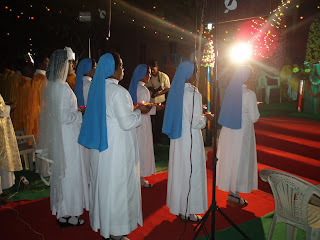
Time for another quiz about driving in India.
At night, it is proper to:
a. drive with your brights on so you can blind the coming driver,
b. drive without any lights,
c. drive with lights on low beams.
Answer, A. Try to drive with your lights on high beams and if necessary, switch to high beams when approaching an oncoming car so they can be sure to see you. Don't worry about blinding them.
How many vehicles can fit across three lanes?
A. three, one per lane.
B. at least two buses, a couple of cars, and as many motorcycles as can fit in,
C. two buses, a truck, two autorickshaws, a half dozen motorcycles, one full-size car and an ox-cart if you use the sidewalk, too.
Answer: C
The Department of Highways insists on safe road conditions. What can be legally used as dividers for a highway?
a. concrete, crash-tested barriers
b. metal guard rails
c. rocks found along the road will be good enough
Answer: C
Define a break inspector(s):
a. a state authorized, testing facility
b. A State highway patrol officer
c. a herd of buffalo lazily crossing the highway
Answer: c
What is the proper speed limit on a state four lane divided highway?
a. 60 mph
b. 60 kph
c. what speed limit?
Answer: c, there are none
What is the proper speed limit in town?
a. 40 kph
b. 40 mph
c. You're kidding, right?
Answer: C, who knows? it's not posted, nobody can go faster than a crawl, most pedestrians walk faster than the cars, and who's going to give you a ticket?
Traffic is slow in town. You're getting impatient. So it's perfectly acceptable to:
a. wait patiently until you can move safely.
b. pull over to the middle lane and go up onto the low curb dividing the highway and just scoot around the problem while everyone else is stuck,
c. whatever it takes.
Answer: B. But C is also acceptable. Using the sidewalk is also a proper form of moving forward in grid lock conditions.
You need to cross lanes so you can get to the other side of the road. It is proper to:
a. go around the block and come out on the other side of the street
b. wait until there is a break in the traffic, then proceed with utmost caution
c. plow right straight through at any point, just hold your hand out to signal that all oncoming traffic should give way to you.
Answer: C
You are pulling into traffic. it is only proper to merge in:
a. at an intersection
b. at an exit or entrance ramp
c. anyplace, anytime, anywhere
Answer: guess
Vendors are allowed to approach vehicles on the street to offer something for sale. True or false?
True, not only allowed but who else would entertain you while your stuck in traffic?
The intersection is in total gridlock. It looks like a medieval battlefield in the middle as everyone tries to advance across. The oncoming cars should:
a. stop and wait until the intersection clears.
b. line up across all lines, face oncoming traffic which is doing the same, and prepare to charge as soon as there is a break in the action.
c. turn around, go home as it is hopeless.
Answer: B. As soon as the car next to you moves, advance at top speed to ram your way through, yelling "Charge" if you wish.
Traffic is slow in the city. You decide that since you're on a motorcycle, it would be best to:
a. go home
b. use the sidewalk and go against traffic
c. wait patiently in your own lane
Answer: B, why not?
FOR EXTRA CREDIT:
You are driving a car in rural India when you accidently hit and kill/injure a person traveling on a smaller form of transportation. You should immediately:
a. try to aid the person. Call 108 for Er, or take him to the nearest medical facility for treatment under the Good Samaritan Rule.
b. call 108 for ER, then call for the police to come. do not leave the scene of the accident under any circumstances.
c. Abandon the car, run as fast as you can and hide until the crowd disperses because the villagers will attempt to kill you as a form of vigilante justice since you were driving a larger vehicle regardless of who was in the wrong. Do not attempt to save the car as they will strip in and it will be a total loss. Try for insurance reimbursement but don't bet the ranch they will give it to you.
Answer: RUN for your life. Do not look back. They may be gaining on you.
Extra-Extra credit:
What time is it when all of the above traffic rules start to seem normal and you are no longer terrified to get into a car?
answer: time to go home


 Some of my experiences that didn't make it into the blog:
Some of my experiences that didn't make it into the blog:









